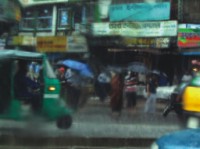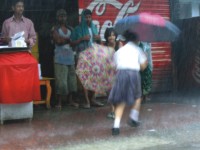
Me and the Rain
Abdus Selim
 This monsoon, they complain, there has been insufficiency of rainfall in Bangladesh--almost reaching the phase of drought. Then, may be God was not all that oblivious to our worldly needs, for one night last month He opened the sluice gate or perhaps His huge rainwater reservoir to inundate Dhaka city goaded by His bipeds who whine for every small thing on the earth. But there are innumerable rain-lovers among us too who find delight in watching raindrops and listening to its music--perhaps like Nero enjoying the torching of Rome--even if it drowns the entire human kind. This monsoon, they complain, there has been insufficiency of rainfall in Bangladesh--almost reaching the phase of drought. Then, may be God was not all that oblivious to our worldly needs, for one night last month He opened the sluice gate or perhaps His huge rainwater reservoir to inundate Dhaka city goaded by His bipeds who whine for every small thing on the earth. But there are innumerable rain-lovers among us too who find delight in watching raindrops and listening to its music--perhaps like Nero enjoying the torching of Rome--even if it drowns the entire human kind.
It is normally seen that poets all over the world are head over heels in love with rain--innumerable examples can be cited from Wordsworth and Tagore. I have every doubt if these two great poets were alive now and had to reside in Dhaka city they would not bother to notice any aesthetics in the raindrops falling from the heaven and be carried away by its music, for here is a city that is so quickly deluged by even an hour's rainstorm.
But rain does bring blessings in disguise by often not allowing us to go out of doors. This happened to me too as I was forced to stay indoors the day following the heavy rainfalls in the city. My typical Bengali mindset dictated me to indulge myself in the muse of poems and I fell back to the golden treasury of my bookshelf where I discovered an unread anthology of South African English Poetry--an almost forgotten gift from my eldest daughter who on one of her trips to that country had bought it for me being familiar with my love for 'magic casement'. There is no doubt that the poetry of South Africa covers a broad range of themes, forms and styles but my previous night's hangover resulting from ceaseless and heavy rainfall that put our metropolis under water unconsciously prompted me to look for poems on rain, and I readily found two of them. The first is by Mary Morrison Webster, a poet of the 1930s--time when the British Crown was made the supreme head over all African Affairs by means of the Native Administration Act of 1927. She was born in Scotland in 1894 and arrived in South Africa in 1920, and obviously being a white she was much more comfortable writing on nature, love and myth, and her favourite theme had to be rain. Her poem titled Rain after Drought exclusively parallels the weather that we are going through now in Bangladesh--rain after drought. The first four lines of Mary's poem read like this:
While talk circled about the room, circled heedlessly, from each to each,
A word there, and laughter, chairs moving, and then words again,
Above the casual interchange and interflow of speech,
I hear the rain.
And her concluding lines are:
To those others, it was only raining; it was my secret; sad and brave
Travelled my thought two ways, and on separate errands, while did it fall;
I heard it patter quietly on the unquiet grass of a new grave;
I listened while, with patient assault, it fell on the roof of him I love,
who never loved me at all.
I admire Mary's portrayal of the rain coming at a time when nobody has expected it and how gradually and inevitably an acoustic contact with the sounding raindrops is established: Above the casual interchange and interflow of speech,/I hear the rain. In the concluding lines she describes how this sound of rainfall at one time moves stealthily deep into her heart and she tries to fathom a mysterious secret that she carries within.
Ten years later when several South African poets were serving with the allied forces and a resurgence of African Nationalism started leading to new crises of the liberal spirit in literary life, H.I.E. Dhlomo, a black poet wrote:
Because I'm black
You think I lack
The talents, feelings and ambitions
That others have;
You do not think I crave positions
That others crave. (Because I'm Black)
I am tempted to quote a few more remarkable lines from Dhlomo's Renunciation:
Everywhere I turn I'm haunted
By the wailing of the wounded,
By the groans of the frustrated,
By the people daily hounded
By fear and hunger,
By man-made danger
Of lack of house and peace and pasture;
Of their poor children's life and future;
 But there was another spirit working simultaneously and steadily in the world of South African poetry which prompted a poet like Alan Paton to write: But there was another spirit working simultaneously and steadily in the world of South African poetry which prompted a poet like Alan Paton to write:
Could you not write otherwise, this woman said to me,
Could you not write things really poetical?
Of many-coloured birds dipping their beaks
Into many-coloured flowers?
…Must you write always of black men and Indians,
Thus in the 1960s South African English poetry saw a change in the language, syntax, attitude and tone. During this time more and more imagist-inspired poetry started to be composed by poets like Ruth Miller and Sydney Clouts. Ruth's image of Rat is in many ways analogous to Clout's Frog, especially when we try to find any definite as well as befitting interpretation of the two. Ruth's rats are:
The rats are fat and warm,
They bide their time until
Without motive, or will,
They deliver us from harm.
While Clout describes his frog as:
no excuse, no
magic tightening
his back into the surface of a stone
or log
or frog
or with a leap, into the heartbeat of a man:
The decades of the seventies saw the rise of the Black Consciousness movements with that of a new black poetry. During the eighties socialist-economic considerations also started to be felt strongly. Relevantly enough I would like to share with my readers what the introduction of the anthology says about the change, “The shift would not only be from the evocation and interpretation of the existing scene to a rhetoric advocating change, but also from emotional utterances to the analysis of social, or class, formations.” To go back to the theme of rain I prefer to refer to Christopher Van Wyk, who was born in 1957 and is still writing. In fact I have borrowed the title of this article of mine from one of his poems--Me and the Rain. I am being provoked instinctively to use two excerpts from two of his poems to show how a South African poet of the present time feels at ease to write on both socio-political issues and nature. The first one is titled Beware of White Ladies When Spring Is Here, and it begins with the following lines:
Beware of white ladies
in chemise dresses
and pretty sandals
that show their toes.
Beware of these ladies
when spring is here.
They have strange habits
of infesting our townships
with seeds or:
geraniums pansies poppies carnations.
As for the other poem, Me and the Rain, Christopher creates some wonderful similes comparing rain with catharsis, aggressiveness, power, etc. But most of all that mysterious legacy of Mary still lingers in him when he too brings the image of graves while talking about rain--perhaps that is the real South African mystery. His final words are: The rain inspires me./Pula! Pula! Pula! (Pula means rain and figuratively refers to renewal).
I would like to quote a line from Wordsworth's The Prelude. Being a passionate lover of nature he said, “sounding cataract haunts me like passion”. After experiencing the torrential rain that night I wish to rephrase Wordsworth and whisper: “sounding rainfall haunts me like a nightmare!”
Web Design: Kazi Ziaur Rahman
Copyright
(R) thedailystar.net 2009 |
